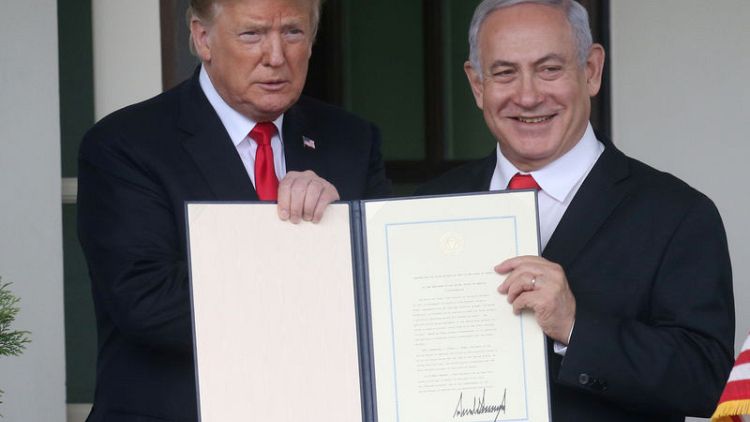By Maher Chmaytelli
DUBAI (Reuters) - U.S. President Donald Trump's decision to recognise Israel's sovereignty over the Golan Heights united Washington's Gulf Arab allies and regional foe Iran in condemnation on Tuesday.
Saudi Arabia, the United Arab Emirates, Bahrain, Qatar and Kuwait criticised Monday's move to recognise Israel's 1981 annexation and said the territory was occupied Arab land. Riyadh and Abu Dhabi said it was an impediment to peace.
Iran echoed the comments, describing Trump's decision as unprecedented this century.
"No one could imagine that a person in America comes and gives land of a nation to another occupying country, against international laws and conventions," President Hassan Rouhani was quoted as saying by state news agency IRNA.
Trump, with visiting Israeli Prime Minister Benjamin Netanyahu looking over his shoulder during a visit to Washington, signed a proclamation on Monday officially granting U.S. recognition of the Golan Heights as Israeli territory.
Israel captured the Golan Heights from Syria in a 1967 war and annexed it in 1981, in a move the U.N. Security Council declared unlawful.
"It will have significant negative effects on the peace process in the Middle East and the security and stability of the region," said a statement on Saudi state news agency SPA.
It described the declaration as a clear violation of the United Nations Charter and of international law.
Trump's special adviser Jared Kushner visited the Gulf Arab region last month to seek support on the economic portion of a long-awaited peace proposal for the Middle East. Gulf Arab states host U.S. troops and are important for Washington's regional defence policy.
Qatar, which has been at loggerheads with other Gulf states over its policies, joined them in rejecting Trump's move and called on Israel to end its occupation of the Golan Heights and comply with international resolutions.
Lebanon said the decision contravened international law.
"The world is witnessing a black day," Lebanese President Michel Aoun said on Twitter during a visit to Russia
(Additional reporting by Bozorgmehr Sharafedin in London, Mohamed El-Sherif in Cairo, Ghaida Ghantous in Beirut, Writing by Sylvia Westall, Editing by William Maclean and Ed Osmond)
